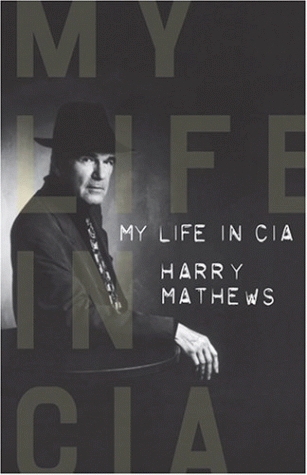I'd known what she would say, and I hated hearing her say it. At 41 I still longed to be thought of as open and good, to seem wonderfully transparent (and transparently wonderful, no doubt). It hurt to be thought of as a spook. Not because by that time it had become shameful but because it was simply wrong.
I had gone through something like this already. Many people in Paris "knew" I was gay, because for years I used to dine several times a week with my best friend, and he was gay. QED. I didn't disapprove of homosexuality, on the contrary; but how could people see me for whoever I was if they made such a basic mistake?
My Life in CIA is Harry Mathews' memoir, ostensibly, of a period in his life in which people believed he was an American intelligence agent working in Paris. God only knows if the real Mathews ever experienced anything like this, but if he did, it certainly didn't play out the way it happens in the novel, though its verisimilitude is bolstered with real friends of Mathews' like the French writer Georges Perec. As Mathews tells it, the rumor came out of his time spent in Laos with a friend who was an American ambassador there, and at first he claims that it caused him shame and consternation, until a friend recommended that he lean into it and make a game out of it.
For Mathews, who was associated with the formalist French literary school Oulipo, complicated "games" are what life and literature are all about, and he goes about this game in a particularly Oulipo way. Recognizing that any real CIA agent would have a job, he starts an ersatz travel company; his first job is to give a speech to group of men who have "travel-stress dyslexia" that make catching planes and trains difficult. He suggests only traveling at times that are palindromes, seeding his explanations with train times to remote Siberian nuclear sites--train times, palindromes, that's the Oulipo stuff, though here it seems rather tame compared to the complex wordplay of a novel like The Sinking of Odradek Stadium.
Anyone can see where My Life in CIA is headed, the same place that a couple dozen more straight-faced books and films head, too: Mathews gets mixed up with the real CIA, real Communists, real right-wing agitators, and eventually gets in over his head. The setup promises hijinks, and delivers: at one point Mathews is rolled up nude in a priceless Persian rug and delivered by coincidence to a banquet of violent right-wingers. At the dinner they discover he's a poet and make him play silly poetry games that force him, quite gleefully, to rhyme "jonquil" with "tronquil." It's extremely goofy. Right after that he makes love to a little person.
Women and sex are another element of the game here: Mathews' depiction of himself is a sort of James Bond-like womanizer, irresistible to women. The little person is one, but there are a half dozen other women clamoring for him, too; and three of them are named Marie-Claude. One of them, who induces Mathews into the mysteries of touchless tantric sex, has the hilarious name of "Marie-Claude Quintelpreaux," which is a very good COINTELPRO joke that I felt very smug for getting. The joke Mathews plays on himself is that, even though he has the seductive quality of a good literary spy, every single attempt made at actual fucking in the book is interrupted. That's how you end up naked in a rug.
At the heart of My Life in CIA are questions of identity: if enough people say Mathews is CIA, could that make him actually CIA? The novel is set during in the early 70's, in the hangover left by the 60's counterculture and by Vietnam, and the CIA is up to no good, getting mixed up, among other things, with Pinochet's coup d'etat in Chile. Though Mathews isn't really a CIA agent, the rise of Pinochet makes him feel guiltily implicated, and the real life bounty on his head threatens to collapse his false identity and the real one.
My Life in CIA is a lot of fun, but something about it made me feel like it could never be as fun for the reader as it is for Mathews, or maybe for poor mixed-up George Perec. There's promise in Mathews' desire to play with his own real world identity, to blur the lines of novel and memoir, but it's not like he's someone whose public persona ever mattered much in the first place, so as a postmodern experience the novel falls a little flat. But I enjoyed it all the same.


No comments:
Post a Comment